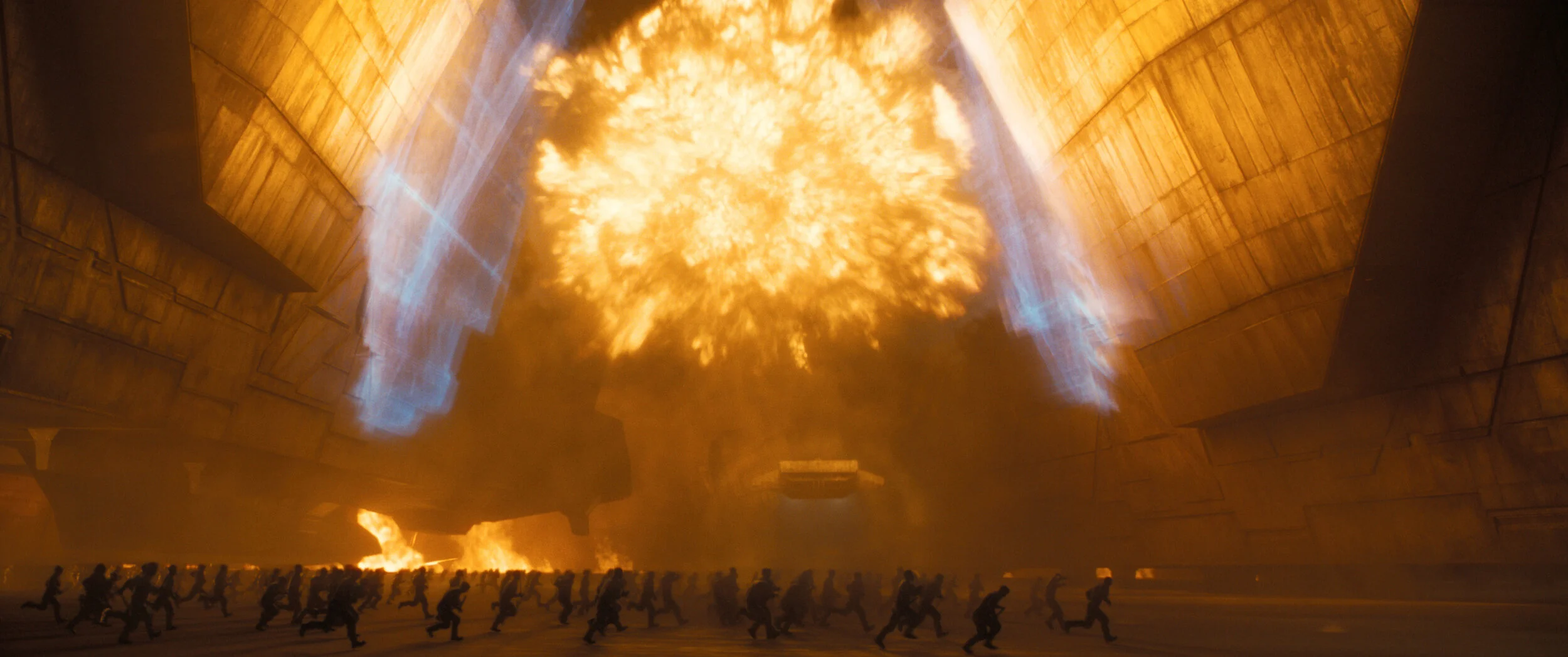Dune: Denis Villeneuve Goes Big and Finds Clarity En Route to Delivering a Previously 'Unfilmable' Epic
By Jim Slotek
Rating: B-plus
Beautifully shot, imaginatively realized and with a narrative clarity that eluded David Lynch, Denis Villeneuve’s take on the Frank Herbert epic-doorstop novel Dune benefits from being only half-told (it advertises itself as Dune: Part I).
Given that, it’s not exactly a spoiler to say this Dune ends with a cliffhanger. But the story it does tell is evocative, painting a big picture and leaving the viewer – well, me anyway – with a clearer understanding of a plot I’ve absorbed before. This might be a Dune that could even be appreciated by someone unfamiliar with Dune.
A battle scene from Dune.
The parts of Herbert’s 1965 novel that later informed Star Wars are undeniable. There’s a load of exposition to start the show, a “chosen one” on a desert planet, an ancient society of defenders possessed of a mind-bending power called The Voice, and even an evil Emperor.
But Villeneuve zeroes in and amplifies another of Herbert’s obvious metaphors. The desert planet Arrakis is a benighted place, cursed with being the sole source of a substance called “spice,” without which space travel is impossible. This invites colonization by major powers for this one item of immeasurable value. Middle East oil, anyone? Notwithstanding their blue eyes, the natives of Arrakis, the Fremen, seem tailored to evoke Arabs of an uncertain era.
PROUDLY SUPPORTS ORIGINAL-CIN
Dune drops us into a shift in the guardianship of Arrakis, with the Emperor effectively ending the administration of the evil clan Harkonnen, whose patriarch is the ugly and oleaginous Baron Vladimir (Stellan Skarsgård, who’s great in anything).
The new landlords will be the Atreides, Duke Leto (Oscar Isaac) and his heir Paul (Timothée Chalamet). Paul’s mother Jessica (Rebecca Ferguson) is a member of the Bene Gesserit, a line of women possessed of great powers. When Paul, a male, starts exhibiting those powers, it causes great consternation. Meanwhile, even as he apparently evolves, Paul has dreams of a young Fremen woman on Arrakis (Zendaya).
So off to the desert planet we go, with hearty comrades (including Jason Momoa, and Josh Brolin as Paul’s battle mentor), hints of a set-up, and an all-out engagement to follow between the Harkonnens and Atreides.
What Villeneuve’s Dune is, is big. The cities on other worlds are huge, the architecture monumental. The ships are impressive, the spice-mining machines are like prehistoric creatures and the ornithopters – the desert flying machines – are like imaginatively reverse-engineered giant bugs.
And, of course, there are the worms, whose very subterranean advances cause the ground to shift. All jaw, they look like they could eat the slugs in Tremors for breakfast.
To be clear, this is not a story told at a Star Wars pace. The necessary set-ups of plot and character are attended to before the spice hits the fan (the first battle scene is an hour in), but the film remains alive even in quiet moments, such that the it doesn’t feel as long as it is. (Two hours, 35 minutes).
Paul’s greater destiny awaits in Part II, and I’m glad they didn’t rush it.
CLICK HERE to read Karen Gordon’s interview with Denis Villeneuve.
Dune. Directed and co-written by Denis Villeneuve. Stars Timothée Chalamet, Oscar Isaac and Zendaya. Opens in theatres Friday, October 22.



